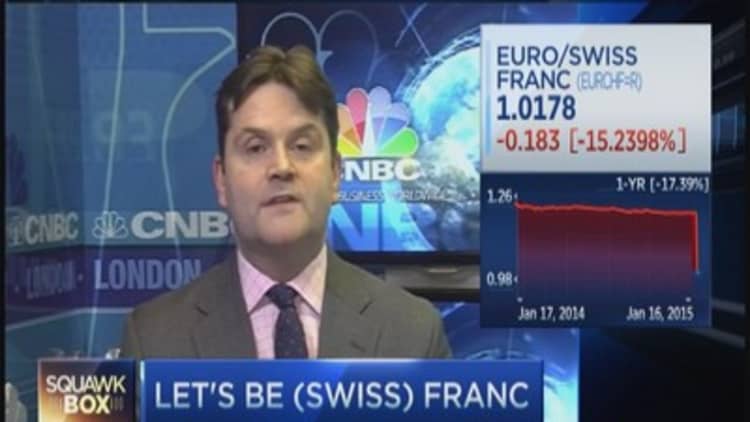The dollar hit a one-week high against the on Tuesday after China growth data was not as bad as many had feared, curbing demand for the safe-haven Japanese currency.
The greenback rose 0.6 percent to 118.25 after touching a one-week high of 118.54. Forecasts from the IMF showing that the United States was on a different growth trajectory than most other major economies also bolstered sentiment towards the dollar, while some talk the Bank of Japan may ease policy added to pressure on the yen.

The euro was under pressure ahead of a possible announcement of a money-printing programme by the European Central Bank as early as at its meeting on Thursday.
Read MoreSwiss move shows euro is like a bad, bad marriage
The euro's weakness pushed the Danish crown back towards recent 2-1/2 year highs. The impact on the crown from Denmark's interest rate cut deeper into negative territory on Monday proved fleeting, with investors expecting it to reduce rates further if the ECB announces a QE programme this week.
Speculation was also growing that the currency's long-standing peg to the euro may be threatened in coming days.
"The Danes will have to offset the impact from further ECB action by taking rates deeper into negative territory," said Jeremy Stretch, head of currency strategy at CIBC World Markets. "That will be the path of least resistance for the Danish central bank."
The euro was trading flat at 7.4345 crowns, easing back from a high of 7.4370 struck immediately after the Danish central bank cut interest rates to -0.20 percent on Monday. The euro had struck a 2-1/2 year low of 7.43 on Monday.
Against the dollar, the euro was trading 0.2 percent lower at $1.1580, having struck a 11-year low of $1.14595 on Friday.
Sources have told Reuters the ECB may adopt a hybrid approach to bond buying that would include buying debt and sharing some of the risk across the euro zone, while national central banks make separate purchases of their own. The programme might be limited in size to 500 billion euros ($579.95 billion).
Greece's snap election on Sunday, with the anti-bailout party Syriza leading in the polls, also added to euro zone uncertainty and to pressure on the euro.
The Bank of Japan began a regular two-day policy meeting on Tuesday.
"Yen selling ahead of policy announcement is notably higher today perhaps on rising expectations of some form of additional monetary easing by the BOJ tomorrow," said Derek Halpenny, European head of global market research at Bank of Tokyo Mitsubishi, London.
"China's GDP growth data today has no doubt helped fuel dollar/yen demand."

